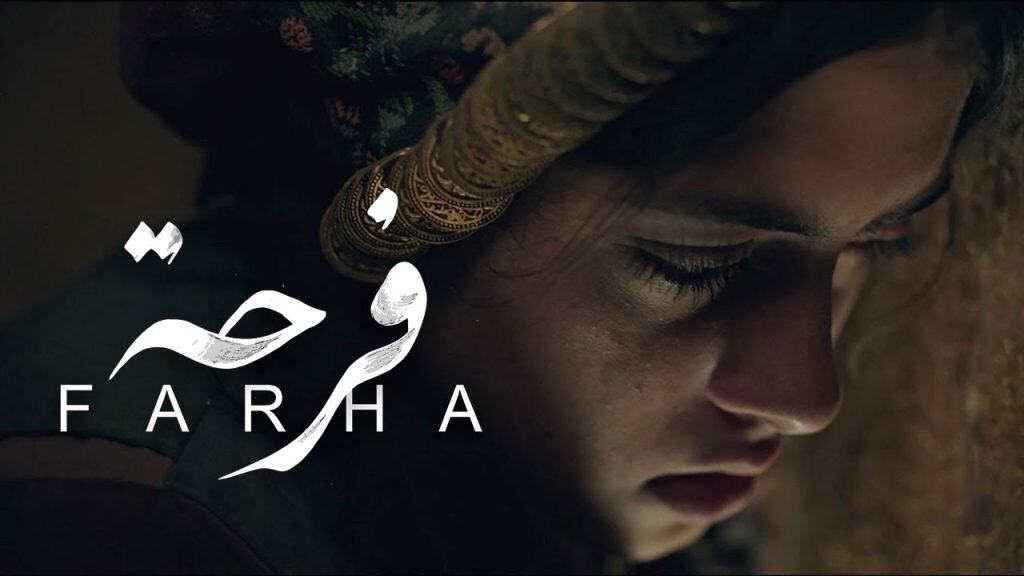Directed by: Darin J. Sallam
Produced by: TaleBox, Laika Film & Television, and Chimney
Runtime: 1 hour 32 minutes
Released: 2021
Rated: TV-14
Overview
Farha (2021), directed by Darin J. Sallam, is a rare cinematic exploration of the Nakba — the mass displacement and massacres of Palestinians during the creation of the state of Israel in 1948. What makes this film remarkable is that it’s Sallam’s debut feature, created on what appears to be a modest budget, yet it delivers a story that lingers long after the credits roll. Rather than attempting to portray the vast scale of the Nakba, Sallam narrows the scope, telling the story through the eyes of one Palestinian girl.
This choice makes the film at once intimate and haunting: the horrors of history distilled into the fragile perspective of a child.
What is Farha About?
The film follows Farha (Karam Taher), a young Palestinian girl whose dreams of education are cut short by the violence engulfing her village. As Israeli forces advance, her father (Ashraf Barhom) seals her inside the pantry of their home, hoping to keep her safe.
Most of the story unfolds within this confined space. The viewer experiences the Nakba not through sweeping battle scenes or panoramic devastation, but through Farha’s tense, claustrophobic waiting — punctuated by muffled gunfire, distant cries, and eventually, a chilling glimpse of brutality when she witnesses an entire Palestinian family executed by Israeli soldiers.
This minimalist storytelling is deliberate. By focusing on the silence, the waiting, and the uncertainty, the film mirrors the trauma of displacement: lives suddenly confined, futures suspended, survival hinging on the unseen.
Key Themes for an Islamic Perspective
Farha‘s greatest power lies in how it conveys the trauma of displacement and the silenced history of the Palestinian people. For a Muslim audience, it is not only a story of survival, but a reminder of the ummah’s duty to remember and bear witness.
- Remembering the Ummah’s History: The Nakba is not only a Palestinian tragedy, it is a tragedy for the entire Muslim world. The destruction of homes, families, and communities in 1948 is part of the collective memory of the ummah, and films like Farha ensure that memory is not erased — despite protests from Israeli officials.1
- The Silence Speaks: Director Sallam chose restraint over spectacle. The violence is never fully shown, only glimpsed. As Sallam herself has said: “Compared to what happened during the massacres, this was a small event. I don’t know why some Israeli officials are very upset about this scene. It’s blurry and out of focus because I always said it’s about this girl’s journey.”2 This restraint reminds us that what is shown is only a fragment of the true scale of the atrocities.
- The Past and the Present: The Nakba is not a closed chapter in history. The ongoing displacement, siege, and massacres of Palestinians today echo the same cruelty.3 Watching Farha in light of current events makes the story feel not just historical, but urgently contemporary.
Important Considerations for the Viewer
- Content Warning: The film contains a disturbing execution scene, though it is intentionally blurred and restrained. Sensitive viewers be aware, though the scene is far less graphic than what really occurred in 1948.4
- Historical Importance: For many outside Palestine, this may be their first encounter with the word “Nakba.” The film serves as an entry point, but viewers should remember it represents only a glimpse of a much larger catastrophe.
- Narrative Bias: The uproar from Israeli officials over the film’s restrained violence demonstrates just how contested Palestinian narratives remain. To some, even the smallest acknowledgment of the Nakba feels threatening. That backlash alone underscores the film’s importance.
Final Review
Farha is not a blockbuster epic — and that is precisely its strength. By focusing on one girl hidden away in a pantry, Sallam renders the Nakba immediate and unforgettable. For Muslims and all people of conscience, this is essential viewing. It reminds us that the foundation of Israel was tied to dispossession and violence, and that remembrance itself is an act of justice.
Where to Watch: Available for streaming on Netflix, Tubi, and Amazon Prime.
Want More?
If you found this review helpful, check out our other reflections in the Media section, including our review of The Mauritanian.
For deeper reading on the history of Palestine and the Nakba, we recommend The Hundred Years’ War on Palestine by Rashid Khalidi — a landmark work that places the Nakba in the broader context of a century of dispossession, resistance, and global politics.
💬 Comments
What did you think of Farha? Did its focus on one girl’s story change how you understand the Nakba? Share your reflections in the comments below.
References
- Sheren Falah Saab, “The First Rule of Israeli Cinema Club Is: You Do Not Talk About This,” Haaretz, 2022, retrieved from Archive.Today, https://archive.is/7CIVR. ↩︎
- Armani Syed, “Why the Director of Netflix’s Farha Depicted the Murder of a Palestinian Family,” TIME, 2022, https://time.com/6238964/darin-sallam-farha-netflix-interview/. ↩︎
- Ghada Abu Muaileq, “From 1948 to now, a Nakba that never ended,” Al Jazeera, 2025, https://www.aljazeera.com/opinions/2025/5/15/from-1948-to-now-a-nakba-that-never-ended. ↩︎
- Ilan Pappé, “The Untold Truths of the 1948 Palestinian Nakba,” UN Palestinian Rights Committee, YouTube video, 2024, https://youtu.be/ldIfup1F8D4. ↩︎

